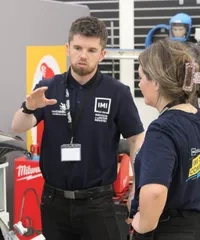T Levels: Getting the talent pipeline running

Post-GCSE technical training is key to delivering fresh talent into the industry and addressing the skills gap, which is why the IMI is supporting the Department for Education’s new T Level qualifications.
Attracting fresh, highly skilled talent to the automotive industry is paramount if it’s to prosper in the future. Part of the challenge is providing the right technical education so that students can learn the skills to succeed, which is why the Department for Education (DfE) has launched T Level qualifications and the IMI has been instrumental in making sure they meet the needs of the industry.
What are T Levels?
T Levels are brand new high-quality courses which follow GCSEs and are equivalent to 3 A-levels. These 2 year qualifications are based on the world’s best technical education systems and blend classroom learning with workplace experience. The first 3 T Levels have now launched at selected colleges and schools across England with the remaining 21 courses rolling out over the next 3 years.
How are T Levels different?
There are three main differences between T Levels and most existing post16 courses:
- Designed by employers for employers: More than 250 employers worked with technical experts to specify the course content so you can be confident that T Level graduates will have the best knowledge and practical skills to support your business.
- Innovative workplace experience: Each student completes an industry placement, lasting at least 45 days, where they put their knowledge and skills into practice on real projects. This allows them to see what their career could be like and, most importantly, become work ready.
- Recognised qualification: These are rigorous courses that are designed to provide a quality alternative to A-levels and apprenticeships for those young people who know the career they want to pursue but also want to keep their options open. Since each T Level is equivalent to 3 A-levels and attracts the same UCAS points, they offer students the opportunity of moving straight into an entry-level skilled role, higher apprenticeship or continuing on to further study.
How was the IMI involved?
The IMI’s Head of Membership Products and Services, Mark Armitage, spent a year on a T Level advisory panel. He worked with other employers and professional bodies to guide DfE on the knowledge and skills students will need to learn for the T Level in Engineering, Manufacturing and Processing and Control which starts September 2022.
“The great thing about T Levels is that they prepare young people for the world of work, both academically and practically. In the automotive sector, one of the key things is safety, and this is something we’ve never been able to teach through a textbook. By spending time in real life work environments, where safety precautions are a must, students undertaking a T Level industry placement will experience first-hand how best to navigate a potentially dangerous (albeit exciting!) work environment,” said Armitage.
How will T Levels help the industry?
T Levels are part of the Government’s strategy to address the skills gap and streamline post-16 education, helping both students and employers understand what young people will learn and where it could lead.
Even before graduates join the labour market, T Level industry placements offer real opportunities to businesses, regardless of their size or sector. Having motivated students complete real projects in your business brings in new ideas, the latest skills and is a great new way to find, nurture and secure young talent.
Armitage added; “I am so glad to have played a part in the development of this exciting new qualification, which I think will meet the needs of employers and provide an excellent route into the sector.”





